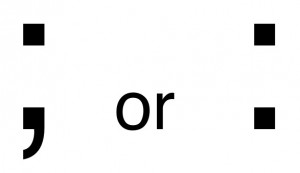When do I use a colon, and when do I use a semi-colon? This is one of the trickier grammatical points, and it’s so common of a question that I even find myself explaining it to my relatives at holiday dinners. A quick read through of this blog post, and maybe I can start referring Aunt Shelby’s questions to you.
SEMI-COLON
Semi-colons are used to LINK separate parts of the sentence. If two clauses in a sentence can stand on their own as individual sentences, it’s alright to use a semi-colon instead of a comma. When using a semi-colon in this situation, however, DO NOT use conjunctions like and, but, or yet. Each clause should be written so that it can be removed from the sentence and left on its own in the paragraph.
It’s difficult to remember when to use semi-colons; reading this blog post should help you understand.
Semi-colons are also used to link items in a LIST, when using a comma would otherwise be confusing. If the items in the list are complex, or have internal punctuation, separate them with a semicolon.
Stacy liked her English class because the kid who sat next to her was cute; P.E., but only on dodgeball day; and lunch, when the hot line served pizza.
To recap, semi-colons are typically used when it would be weird to use a comma or period. Plus, they make your writing appear more sophisticated and mature!
COLON
Like semi-colons, colons are used AFTER a complete, independent clause. UNLIKE semi-colons, the clause that comes after the colon may be dependent. This typically happens in one of two ways. The first sentence will be a general idea that introduces something more specific:
I’ve been feeling very lonely lately: it’s been a week since I last saw my best friend.
Or preceding a list:
It’s important that we pick up the things we need for the weekend: a lantern, a Frisbee, and a giant inflatable house.
Remember, when using a colon in front of a list the first half of the sentence must me an independent clause! DON’T use a semicolon like this:
John, when you go to the store, will you pick up: three candy bars and a thing of yogurt?
Follow these rules and you’ll be the person everyone wants to sit next to at Thanksgiving!
By: Catherine Martin






